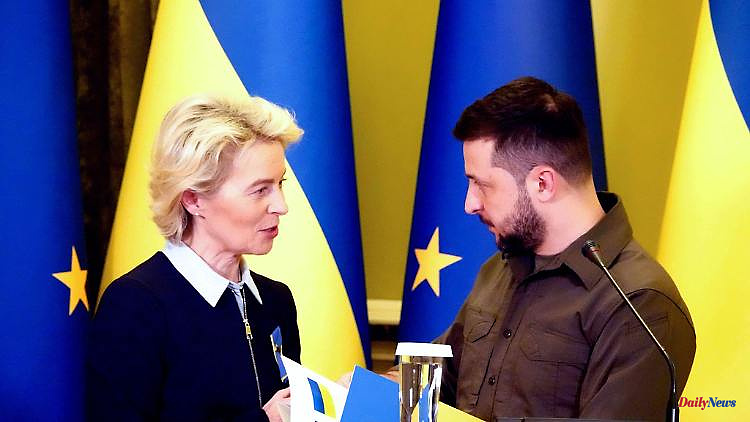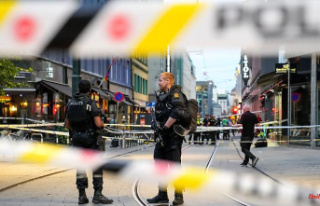The EU grants Ukraine candidate country status. In the critical phase of the war, this is an important signal for the country. But can the country really manage to meet the EU criteria? Two problems in particular must be solved.
While Russian troops are crushing the Donbass, there is also a glimmer of hope these days: the EU is granting Ukraine candidate country status. Even if one could argue that arms deliveries are currently more important, many in the country see this as an important signal. The EU extends the long-awaited hand to Ukraine. It's a moment of relief: the train is now "put on the track", as André Haertel from the Stiftung Wissenschaft und Politik (SWP) says in an interview with ntv.de.
You might also find it unrealistic to think now about what might be in a few years. First of all, Ukraine must push back the Russians. First of all, it must be certain that there is still a Ukraine that can join the EU. Nevertheless, the decision has been made and the question arises as to how far Ukraine is on its way to the EU. One thing is clear: in front of the country there is no walk, but a long, strenuous hike.
In the coming years, the government will have to prove that democracy, the rule of law and the market economy are working and, moreover, adopt all of European law, known as the "acquis communitaire". So there is a lot of work waiting for the country: Currently, Ukraine is still a long way from meeting the accession criteria in all areas, says Härtel.
One problem overshadows all others: corruption. It still determines the everyday life of many people. Haertel: "You know when you go to the doctor that you won't get any treatment or not good treatment if you don't pay anything extra. You bring an envelope with money with you. You also know that you can buy university degrees. If you If you want to do a doctorate, it's not for nothing." You have to pay the professor at least $1,000 to sign the certificate. The population has internalized this because "it just doesn't work any other way".
And then, of course, there is the big corruption, which involves big money, dark channels and unscrupulous oligarchs. "People use political offices to enrich themselves," explains Härtel. "For example, when you are involved in placing orders. You then use certain channels to direct them to your own companies or to those of friends."
But there are also glimmers of hope. For example, the successful areas of decentralization reforms: They also help in the fight against corruption, as Wilfried Jilge from the Berlin Center for International Peace Operations explains in an interview with ntv.de. So far, a local ruler as a member of parliament could have "get something out for his region" with a grand gesture and thus put himself in the limelight at home - for example by promising the construction of an ice hockey stadium.
He would then have benefited from his own resources, for example through construction contracts that bring prestige or with which one's own power networks and positions can be fed. At the same time, the municipality would have needed the money more urgently elsewhere, for example to repair roads. As a result of the reforms, part of the tax revenue goes directly to the regions, where local politicians can use it for what really matters - such as the roads mentioned. "Even if that hasn't undone the above-mentioned practices, new counterweights have been created that can stimulate democracy from below," says Jilge.
Haertel also observes an incipient change in mentality. "I would say that the sensitivity to corruption has grown, especially among young people." Its negative effects have been felt for a long time now. In particular, that the state and its institutions are weak and there is hardly any money for the things that are expected of it. "These are the negative consequences of the permanent exploitation of the state. There is no money for anything." Initially, corruption was still tied to individual politicians. "But the Ukrainians have had substantial experience of what corruption means."
The younger generation and civil society are among the forces driving the fight against corruption, along with Western countries and a "very small faction in the political elite". "There are still too many opponents and blockers in the elite who are interested in the status quo because they benefit from it or are afraid that radical reforms will endanger their power base," says Härtel.
At the same time, President Volodymyr Zelenskyj gives an at least ambivalent picture. "One cannot say that he is a radical reformer," says Härtel. He believes that he has a vision for the country and that he is a reformer to a certain extent. For example, he pushed a law against oligarchs through parliament. But when the former actor became president, he needed advisers and allies from the political class. "And since corruption was so widespread for a long time, you can always find something with them if you look for something," says Härtel.
Selenskyj is said to have specifically protected these people from corruption investigations. "In doing so, he has entered dangerous waters. That is a very fine line between a certain control of the anti-corruption fight and sabotage." Jilge also says that Selenskyj "must finally learn what the separation of powers is."
Haertel assumes that the fight against corruption will gain traction after the war, since the state must be strong in order to be able to defend itself against new aggression. If he was constantly being hollowed out, that wouldn't work. A rethinking can also be seen among the oligarchs. Many of them now see the advantages of protecting their property through the rule of law and no longer being dependent on nepotism and well-meaning politicians. Some would also have lost their influence through the war - because their property was destroyed.
According to Jilge, the National Anti-Corruption Bureau has built a good reputation compared to other judicial organizations. "It didn't make friends with it. And that's good news." It is now crucial that a technically suitable and independent prosecutor for anti-corruption is appointed in a transparent process and can work effectively. That is not the case yet.
For Jilge, reforming the rule of law is as important as fighting corruption. "Without a reliable rule of law, you don't even need to start the fight against corruption," he says. This also plays a role for the economy, for example in investment protection. If a foreign company can be sure that oligarchs are not gaining unfair economic advantages over competitors, that helps there too. Most people in the country still have little trust in the judiciary. Too many perpetrators get away with it. But he also points to the first positive results - for example with the High Council of Justice (HRR). He nominates the judges who are appointed by the President.
When its members were checked, some had withdrawn voluntarily. This is the basis for the fact that judges can now gradually be filled with lawyers who are proud to defend the rule of law and do not want to just take instructions from above or work for their own benefit. However, there can always be setbacks: The Ethics Council has just approved candidates for the HRR whose integrity, according to Ukrainian experts, must be seriously questioned.
The reform of the constitutional court must also be completed and the vacant judge positions must be filled with impeccable people. The aim must be for young people to become judges and prosecutors on the Kiev Maidan in the spirit of the values of the Revolution of Dignity. "If we continue to work on the positive approaches, important progress can be made in the next few years," says Jilge. The candidate status gives the reformers momentum, according to the motto: We have to do this now, otherwise we'll never get into the EU.
The fact that Ukraine is still a long way from meeting the accession criteria does not mean that it has not been working on it for a long time. A lot has happened since the association agreement with the EU in 2014, and not just in the judiciary. New authorities have been created everywhere to supervise and ensure quality. Apparently it worked out well for the military. A national health service was also set up and reforms in the education system initiated - however, in these areas in particular these have almost died out, says Härtel. And: Many of the new institutions are weak and can hardly defend themselves against political influence.
Ukraine is also doing relatively well when it comes to democracy issues such as freedom of expression and elections. "Basically, everyone can say what they think," says Jilge. One problem, however, is that oligarchs are behind the big broadcasters, and a balanced presentation of opinions is not always guaranteed. According to Haertel, the elections are largely fair and free, even if there are still occasional attempts at fraud.
So Ukraine is not starting from scratch on its long road to Europe. Compared to other post-Soviet states like Russia itself, Belarus or Azerbaijan, the past eight years in Ukraine have been a success story, says Härtel. According to him, some in Ukraine are hoping that accession could be ready in five to seven years. Others are closer to ten years. However, a scenario such as that in the case of Albania, North Macedonia or Turkey is also possible, where the accession procedures are taking significantly longer or are completely on hold for various reasons.
For Jilge, however, the number of years is not that important. "It is more important that Ukraine's progress is also recognized and that the country really moves closer to the EU every time," says the Ukraine expert. That is why the EU and Ukraine must also agree on priorities from which people would benefit directly even in war. It is also conceivable to offer the country partial membership in those areas in which it already meets the requirements. The forces willing to reform in Ukraine and the EU should use the candidate status as an anchor. In this way, they could already take the first positive steps against the resistance of old cliques - and thus show the skeptics in the EU that the granting of candidate status was the right step.
If Ukraine does its homework, then it would actually have a chance of joining the EU in a few years. Assuming they still exist at all.












